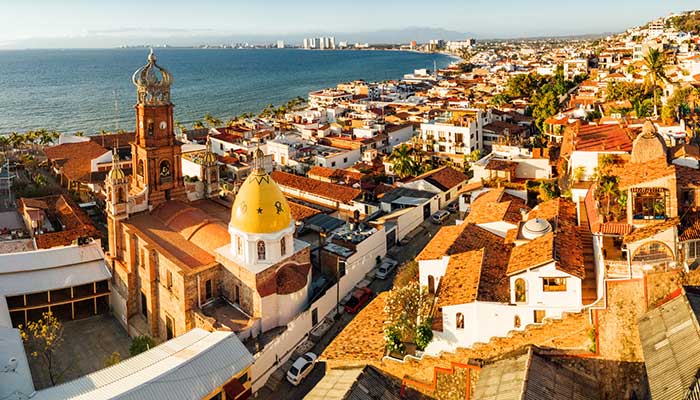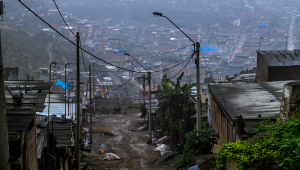There is an old saying in Mexico: “You don’t have to get there first, you just have to know how to get there in the first place.”
In short, patience is a virtue – something that the usual suspects in global investment circles eager to find fault with the country’s president might do well to reflect upon.
Some of them have pounced upon an unexpected contraction in GDP of 0.2% in the first quarter to raise concerns about the outlook for the whole of 2019 – talking up existing anxieties about Latin America’s second-largest economy.
The preliminary data from the national statistics institute – detailed figures will be published next week – are not exactly the meltdown predicted in some circles after Mexico elected a left-of-centre president last year.
But coming not long after president Andrés Manuel López Obrador completed his first 100 days in office – amid stratospheric expectations – they contain a veiled warning for Mexico’s leader: international investors are waiting for things to go wrong.
Known as AMLO, the president took office in December after a landslide election victory, brandishing a costly wishlist aimed at reviving an interventionist state amid optimism after years of endemic corruption and unimpressive growth.
He promised to expand social programmes, raise pensions, transform opportunities for the young, hike the minimum wage, and double public infrastructure investment while rationalising public expenditure by slashing Mexico’s obese bureaucracy and balancing the books – without raising taxes or debts.
The recent setback came on 30 April, when data revealed that in the first quarter growth slowed to 1.3% on an annualised basis compared with the same period in 2018 – down from 2% last year overall.
Evidently, this year’s prospects are set to be well below López Obrador’s ambition of annual average growth of 4% during his six-year term.
'The preliminary data from the national statistics institute – detailed figures will be published next week – are not exactly the meltdown predicted in some circles after Mexico elected a left-of-centre president last year.'
Most forecasts now put likely growth in 2019 between 1.2% and 1.6%, giving some analysts ammunition for downbeat assessments – and room for criticism – of a president who they say is taking too long to find his feet.
This setback reflects several factors, few of which are attributable to AMLO – transitions to a new government hinder growth, the global economy is slowing, ratification of the new US-Mexico-Canada trade deal approved last year has been thrown into disarray by president Donald Trump’s tariffs tantrum, and low oil prices are further hindering the dwindling output of state-owned Pemex.
However, international investors set their own yardsticks – and all the evidence suggests they are determined to find fault.
Gross fixed investment fell 6.8% in December when López Obrador took office, and his decision to cancel a $13bn airport project backed by the country’s business elite hit the value of stocks, bonds and the peso.
AMLO’s antipathy to private participation in the energy market and determination to restore the role of the state – as Pemex continues to languish – is also blamed for lack of investor interest in restoring the fortunes of Mexico’s once proud oil sector.
Mexico’s president has demonstrated before that he is a law unto himself, both able to confound his critics and collaborate with them.
But he clearly has his work cut out to boost the business confidence that Mexico will need if it is to raise levels of private investment in the economy – a critical task, given that this is nearly 7 times the level of public investment.
Yet as the saying above reveals, AMLO’s entire political career has been a demonstration that patience is a virtue, after being in opposition since 1988 and winning the presidency against the odds only on his third attempt.
As a recent OECD report on Mexico’s economy confirms, the main obstacles to growth in Mexico are structural – and pertain to precisely the agenda its new president has outlined: strengthening institutions, boosting productivity, and tackling inequality.
The latest OECD Economic Survey of Mexico discusses the links between low living standards and stagnant productivity, poor educational outcomes, weak rule of law, obstacles to competition, and widespread informality.
It insists that strengthening Mexico’s notoriously ineffective institutions would have the largest impact on growth of any structural reform, alongside action to reduce the yawning gap between the modern productive economy in the north and centre of the country and the traditional, more indigenous south.
“The Mexican economy has performed well in recent years, but is now facing serious headwinds from the external environment and important structural challenges at home,” said OECD secretary-general Angel Gurría at the report’s launch.
“The only response is to continue designing and implementing new reforms to instil confidence, improve the quality of public administration, increase opportunities, reduce inequalities and bring about a stronger and more inclusive society for all Mexicans.”
This is tantamount to an exhortation of patience, and López Obrador’s influential detractors – who seem to have few reserves of the virtue and want change yesterday – should take note.
It should be music to the ears of López Obrador, the name of whose party, Morena, stands for the National Regeneration Movement but is also a clever play on words that means “dark-skinned”, alluding to AMLO’s strong commitment to the indigenous south.
Mexicans may still be waiting for their progressive revolution – but the key to understanding policymaking under this president is the direction of travel, something the OECD has recognised.
After all, “you don’t have to get there first, you just have to know how to get there in the first place”.















